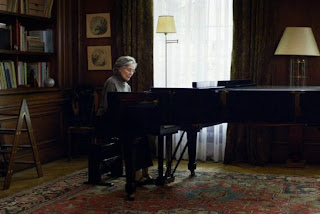Amour
**** out of ****
Directed by: Michael Haneke
Starring: Emmanuelle Riva,
Jean-Louis Trintignant, Isabelle Huppert, Alexandre Tharaud and William Shimell
Running time: 127 minutes
By the window of the den in Anne
and Georges’ Paris apartment rests a black piano. Anne (Emmanuelle Riva) and Georges (Jean-Louis
Trintignant) are retired piano teachers in their eighties who rarely dabble in
musical exercise anymore. However, even with a whole life together under their
belt, a sharp, discordant minor note attempts to cripple their harmonious
marriage.
Amour, the latest film from
Austrian auteur Michael Haneke, was 2012’s most celebrated film – and
rightfully so. It won the Palme D’or at Cannes (Haneke’s second in four
festivals) and is a shoe-in for the Foreign Language Film Oscar in a couple of
weeks.
Haneke is a more macabre
“master of suspense” than Hitchcock, his films notable for their dark themes
(The White Ribbon), explorations of violence (Funny Games) and enigmatic
endings (Cache). Amour continues all three of these trends but is also the
director’s most humanist and emotionally devastating effort yet.
One lovely morning, the couple engages in small talk over breakfast when Anne suddenly freezes.
Georges tries to break her out of a lifeless stare during this lapse, which
turns out to be a stroke.
After a surgery goes wrong,
she becomes paralyzed on her right side. Georges requests that she stay in the
hospital to have constant medical supervision. She refuses and makes him
promise, begrudgingly, to keep her at home. She declares stubbornly that she
“won’t fall to pieces” by staying confined to the apartment, much to the chagrin of
Georges and her daughter, Eva (Isabelle Huppert).
Nevertheless, Anne’s health
quickly deteriorates. Georges becomes increasingly distraught at coping with
his wife’s resistance to hospital care. Although their bond is still as strong
as ivory, he cannot stand to hear that she is thinking of death. “You inflict
nothing on me,” he reassures her. But a face more used to vitality shrinks to a
defeated sullenness, as their love is further tested.
Haneke is a precise director
known, beyond his film’s bleaker themes, for staying detached from the
characters, observing their crises from a distance. Regardless of the sterility
that demands the audience be patient with his stylistic choices – he frequently shoots scenes
in one or two long takes – Amour is his most absorbing film to date. His
uninterrupted takes build suspense, as does the lack of any musical score, save for a few brief piano refrains.
The two actors at the centre
are superb. Both are best known for esteemed careers in French cinema: Riva broke through
in Jean Resnais’ haunting Hiroshima, Mon Amour, while Trintignant’s role in
Bernardo Bertolucci’s The Conformist is equally striking.
Riva is spellbinding as the
defiant Anne, whose brusque attitude turns fragile when her speech begins
deteriorating, reducing her livelihood to bellowing aches that echo through the apartment.
Trintignant’s Georges, the
pained suitor trying to find a way to keep control of himself as his wife
becomes more sick, is haunted by the finality of time. During a faintly lit
scene where Anne is asleep, Georges listens intently to her breathing, aware that he may soon never listen to these whispered inhalations for much longer.
The film’s intimate scale does
not dilute the extraordinary power of the performances, but only heightens the
poignancy of the characters’ love. Amour is an arresting look at the demands of
love that does something unparalleled: it warms your heart and breaks it at the
same time.





Bravo! Although the film was a masterpiece it was depressing for the older crowd. What did you surmise from the ending?
ReplyDelete